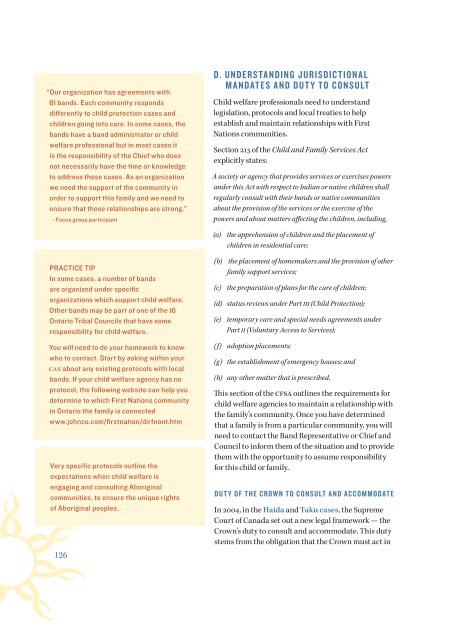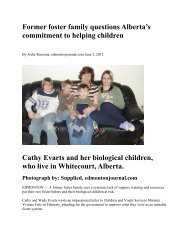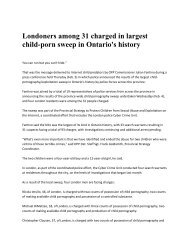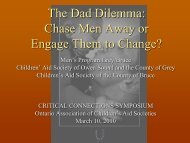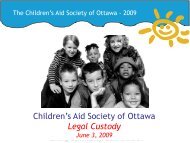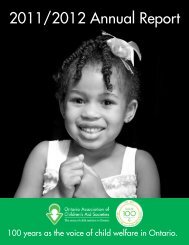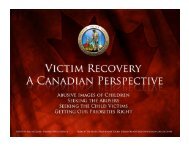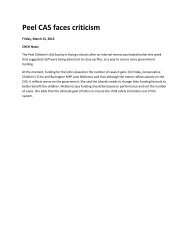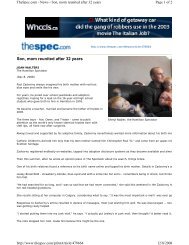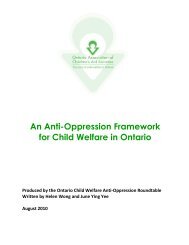English - Ontario Association of Children's Aid Societies
English - Ontario Association of Children's Aid Societies
English - Ontario Association of Children's Aid Societies
Create successful ePaper yourself
Turn your PDF publications into a flip-book with our unique Google optimized e-Paper software.
“Our organization has agreements with<br />
61 bands. Each community responds<br />
differently to child protection cases and<br />
children going into care. In some cases, the<br />
bands have a band administrator or child<br />
welfare pr<strong>of</strong>essional but in most cases it<br />
is the responsibility <strong>of</strong> the Chief who does<br />
not necessarily have the time or knowledge<br />
to address these cases. As an organization<br />
we need the support <strong>of</strong> the community in<br />
order to support this family and we need to<br />
ensure that those relationships are strong.”<br />
- Focus group participant<br />
D. UNDERSTANDING JURISDICTIONAL<br />
MANDATES AND DUTY TO CONSULT<br />
Child welfare pr<strong>of</strong>essionals need to understand<br />
legislation, protocols and local treaties to help<br />
establish and maintain relationships with First<br />
Nations communities.<br />
Section 213 <strong>of</strong> the Child and Family Services Act<br />
explicitly states:<br />
A society or agency that provides services or exercises powers<br />
under this Act with respect to Indian or native children shall<br />
regularly consult with their bands or native communities<br />
about the provision <strong>of</strong> the services or the exercise <strong>of</strong> the<br />
powers and about matters affecting the children, including,<br />
(a) the apprehension <strong>of</strong> children and the placement <strong>of</strong><br />
children in residential care;<br />
PRACTICE TIP<br />
In some cases, a number <strong>of</strong> bands<br />
are organized under specific<br />
organizations which support child welfare.<br />
Other bands may be part <strong>of</strong> one <strong>of</strong> the 16<br />
<strong>Ontario</strong> Tribal Councils that have some<br />
responsibility for child welfare.<br />
You will need to do your homework to know<br />
who to contact. Start by asking within your<br />
CAS about any existing protocols with local<br />
bands. If your child welfare agency has no<br />
protocol, the following website can help you<br />
determine to which First Nations community<br />
in <strong>Ontario</strong> the family is connected<br />
www.johnco.com/firstnation/dirfnont.htm<br />
Very specific protocols outline the<br />
expectations when child welfare is<br />
engaging and consulting Aboriginal<br />
communities, to ensure the unique rights<br />
<strong>of</strong> Aboriginal peoples.<br />
126<br />
(b) the placement <strong>of</strong> homemakers and the provision <strong>of</strong> other<br />
family support services;<br />
(c) the preparation <strong>of</strong> plans for the care <strong>of</strong> children;<br />
(d) status reviews under Part III (Child Protection);<br />
(e) temporary care and special needs agreements under<br />
Part II (Voluntary Access to Services);<br />
(f) adoption placements;<br />
(g) the establishment <strong>of</strong> emergency houses; and<br />
(h) any other matter that is prescribed.<br />
This section <strong>of</strong> the CFSA outlines the requirements for<br />
child welfare agencies to maintain a relationship with<br />
the family’s community. Once you have determined<br />
that a family is from a particular community, you will<br />
need to contact the Band Representative or Chief and<br />
Council to inform them <strong>of</strong> the situation and to provide<br />
them with the opportunity to assume responsibility<br />
for this child or family.<br />
DUTY OF THE CROWN TO CONSULT AND ACCOMMODATE<br />
In 2004, in the Haida and Taku cases, the Supreme<br />
Court <strong>of</strong> Canada set out a new legal framework — the<br />
Crown’s duty to consult and accommodate. This duty<br />
stems from the obligation that the Crown must act in


